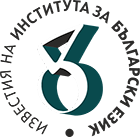Tag: History of the Bulgarian Language
On the meanings of the verbs oblagati/oblozhiti and their derivatives in the Old Slavic literature (towards the question of the development of the semantic structure of the word in the history of the Bulgarian language)
Elka Mircheva Institute of Bulgarian Language, Bulgarian Academy of Sciences Abstract: The study reveals the historical changes in the semantics of the verbs облагати / обложити and their derivates облогъ, обложениѥ, обложник. Material from lexicographical works, electronic corpora of medieval texts, manuscripts is used. The obtained data have been structured in view of the semantic […]
Read More → On the meanings of the verbs oblagati/oblozhiti and their derivatives in the Old Slavic literature (towards the question of the development of the semantic structure of the word in the history of the Bulgarian language)Historical anthroponymy from the village of Kobalista, Drama region
Georgi Mitrinov Institute for Bulgarian Language, Bulgarian Academy of Sciences Abstract The topic of historical anthroponymy is not well developed in Bulgarian onomastics. This applies to the study of historical anthroponymy of individual settlements, regions, districts, in a synchronic and diachronic plan. And it is important, especially when it comes to historical anthroponymy from areas […]
Read More → Historical anthroponymy from the village of Kobalista, Drama regionThe Law and the Law Books: Two Examples from the Translated Juridical Literature on the South of Slavs in the 14th Century
Mariyana Tsibranska-Kostova Institutе for Bulgarian Language, Bulgarian Academy of Sciences Abstract The article focuses on the following two texts: About the Civil Laws from the Introduction to the Mathew Blastares’s Syntagma, and the textual unity From the Law Books about the Kinship and the Forbidden Marriages in the so called Nomocanon Cotelerii, or the Slavonic […]
Read More → The Law and the Law Books: Two Examples from the Translated Juridical Literature on the South of Slavs in the 14th CenturyEXPLAINED WORDS IN THE MIDDLE RHODOPE REVIVAL WRITTEN MONUMENTS WITH GREEK LETTERING (Features and trends in vocabulary variation)
Georgi Mitrinov Institute for Bulgarian Language, Bulgarian Academy of Sciences Abstract The study of vocabulary in Revival written monuments is important for the history of the Bulgarian language. The article deals with the lexical features of middle Rhodopes Revival written monuments. The vocabulary of foreign origin (Greek and Turkish) included in the texts is compared. […]
Read More → EXPLAINED WORDS IN THE MIDDLE RHODOPE REVIVAL WRITTEN MONUMENTS WITH GREEK LETTERING (Features and trends in vocabulary variation)The Historical Church Heritage from Bulgarian Revival in Western Thrace and Eastern Aegean Macedonia II. Inscriptions on Icons and Cloaks
Georgi Mitrinov Institute for Bulgarian language, Bulgarian Academy of Sciences Abstract The article studies the inscriptions (Cyrillic and Greek) on the icons and cloaks of former Bulgarian churches in the Western Thrace and Eastern Aegean Macedonia. It presents new data on the Bulgarian ecclesiastical and historical heritage in the geographical area under consideration. In this […]
Read More → The Historical Church Heritage from Bulgarian Revival in Western Thrace and Eastern Aegean Macedonia II. Inscriptions on Icons and CloaksThe Orthography Profile of a Bulgarian Clerk of 1889 (Sofia Region)
Margaret Dimitrova Sofia University “St. Kliment Ohridski” Abstract This paper discusses the spelling of an administrative document of 1889 describing the clothing in Sofia region. Ten years after the liberation of Bulgaria from the Ottoman rule, the governors of the different regions of the liberated country were asked by the Ministry of Internal Affairs to […]
Read More → The Orthography Profile of a Bulgarian Clerk of 1889 (Sofia Region)QUO VADIS BULGARIAN STUDIES: PROF. MACHIEL KIEL ON BULGARIA AND BULGARIANS. PART II
Maxim Stamenov Institute for Bulgarian Language, Bulgarian Academy of Sciences Abstract Why Bulgarian studies? Each professional in the field has a personal story to tell on the subject. For Bulgarians, it is a matter of definite interest to find out why a foreigner may choose to dedicate their professional life to Bulgaria and Bulgarians instead […]
Read More → QUO VADIS BULGARIAN STUDIES: PROF. MACHIEL KIEL ON BULGARIA AND BULGARIANS. PART IIDIASTRATY AND DIACHRONY. CHANGES IN THE LEXIS OF MEDIEVAL BULGARIAN MANUSCRIPTS
Vanya Micheva Institute for Bulgarian Language, Bulgarian Academy of Sciences Abstract The paper examines the lexical changes in two copies of Hagiography of s. Mary of Egypt and in two texts of Hagiography of s. Paraskeva. The first copy of Hagiography of s. Mary of Egypt is in Bdinski zbornik from 14th c. and the […]
Read More → DIASTRATY AND DIACHRONY. CHANGES IN THE LEXIS OF MEDIEVAL BULGARIAN MANUSCRIPTSLexical Expression of Sadness: from the Homeric Language to the Modern Bulgarian
Bilyana Mihaylova, Ekaterina Tarpomanova, Albena Mircheva Sofia University St. Kliment Ohridski Abstract The paper aims at comparing the lexical items expressing sadness in Homer’s poem Iliad and one of its translated versions in Bulgarian. Our approach comprises the following steps: compilation of synonym sets with the meaning ‘sadness’; contextual analysis of the identified words in […]
Read More → Lexical Expression of Sadness: from the Homeric Language to the Modern BulgarianThe Prepositionalisation as a Word-forming Method in the Old Bulgarian Language
Tatyana Ilieva Cyrillo-Меthodian Research Centre, Bulgarian Academy of Sciences Abstact The article studies, from the diachronic aspect of the development of the Bulgarian language, the process of prepositionalization as a case of transposition. The formation of the secondary prepositions is tracked on the basis of the transition of the full words to the function words. […]
Read More → The Prepositionalisation as a Word-forming Method in the Old Bulgarian Language
